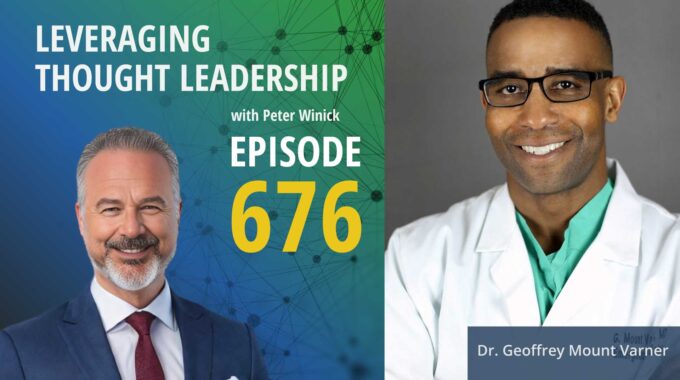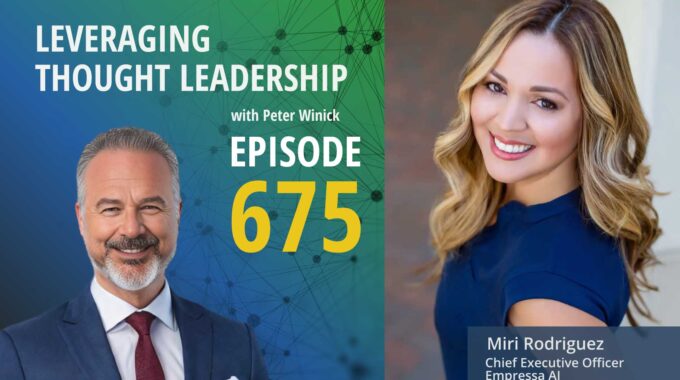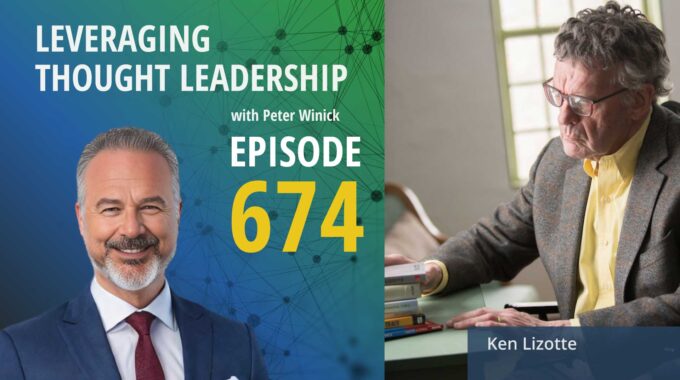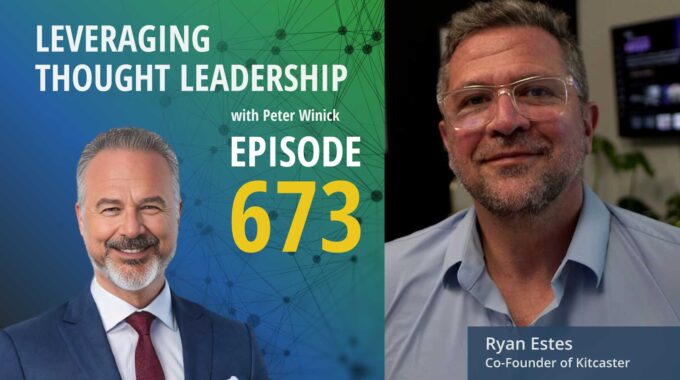The leadership advantage of acting with clarity, confidence, and purpose. This episode explores how leaders…
Leveraging Thought Leadership With Peter Winick – Episode 194 – Freddie Ravel
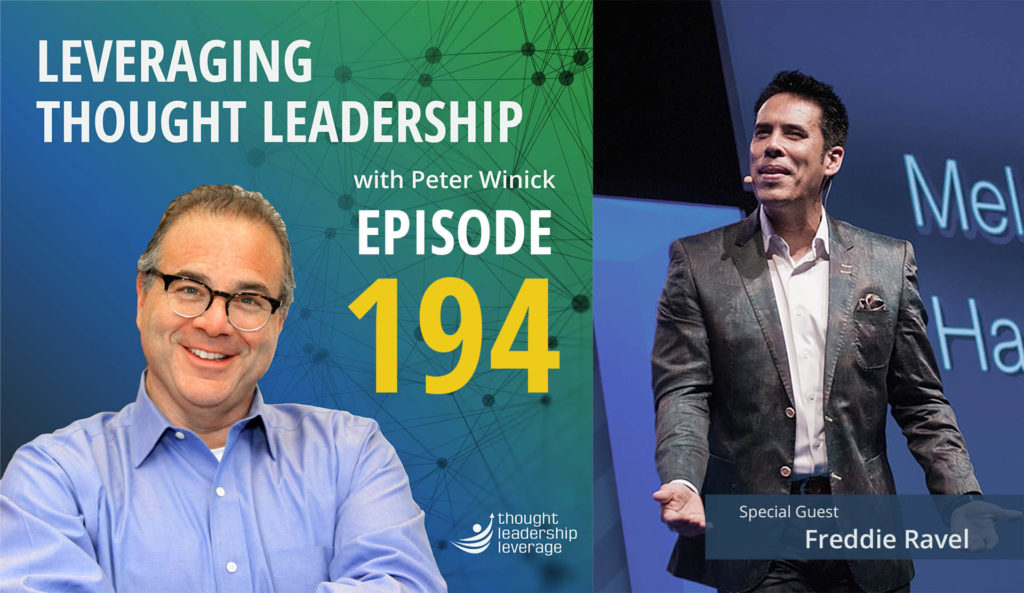
Think about your favorite musician. Did you realize that they are a Thought Leader? Think about it! They inspire, captivate an audience, and deliver a message through their music! What if your Thought Leadership could be that successful?
Our guest in this episode is Freddie Ravel, a Grammy Nominated performer who has worked with musical legends like Earth, Wind, and Fire, Madonna, and Prince. Freddie merges music and education, successfully bringing his message of active listening to crowds around the world.
Today, Peter and Freddie discuss the way concerts bring “edu-tainment” to the stage with a captivating tempo. Freddie shares how he handles the business side of keynote speaking; building relationships with speaker agents, doing your homework before every gig, and how to be specific about your Thought Leadership’s impact and benefit. Turn the music down, and turn your Thought Leadership up!
If you have a unique take on the speaker’s industry, and are seeking to gain visibility, Thought Leadership Leverage can help you get heard!
Transcript
Peter Winick And welcome, welcome, this is Peter Winick. I’m the founder and CEO of Thought Leadership Leverage. And you’re joining us on the podcast today, which is Leveraging Thought Leadership. I’ve been excited to get today’s guest scheduled for a while, because Freddy’s an old friend. We go back 10 plus years. So my guest today is Freddy Ravel. Freddy shares the lessons that he’s learned by giving his clones the vital tools to live their own life in tune. He’s, as far as I know, the guy that’s invented the term keynote concert, and we’ll talk about that in a little bit. He’s got a musical career that’s amazing. So he’s worked with Sergio Mendes. He’s directed Earth, Wind and Fire. He’s been on the big screen with Madonna. He’s played for all over the world with Carlos Santana, with Prince. The only one here on the list that we may ask you to apologize for, Freddie, is Kanye, but we won’t go there. And then he’s also worked with JLo and Lady Gaga. And today he’s here with us. He’s also an author and here he is. So welcome aboard, Freddie. Thanks for coming on.
Freddy Ravel Hey Peter, thank you for having me. It’s great to be with you and I well remember the days that we first connected in San Francisco. So it’s a pleasure to be you again.
Peter Winick Yeah. Oh, thank you so much. So let’s dive in. So you, you’re a Grammy-winning musician that’s, that’s worked with, you know, as I mentioned before, some of these amazing, amazing, amazing folks, uh, and, and had a long standing and still have a long-standing career as a musician. And then you sort of evolved, you, sort of your passion, your love, your expertise for music with the people side of it, right? In the sort of keynotey thing, but not as a keynoter. And I’ve had the privilege of seeing you live several times. in what I would call sort of the keynote concert. So talk about how that concept was born, if you will. Where did that come from?
Freddy Ravel Well, thank you. What a lot of people don’t know is that certain artists that you work with really are thought leaders in of their own. Someone like Earth, Wind & Fire, they’re kind of credited as the band that brought black and white America together. And so, really, really great evolution for me to work with them because they were already talking about keeping your head to the sky. They were already taking about motivation. They were already singing about it from the mid 70s. Sure. By the time I became their musical director, their music was laced with human potential. It was filled with that message of elevating humanity. And then you fast forward to the years I worked with Carlos Santana, and he’s kind of part of that same tribe, Peter, you know? Yeah. In other words, all these musical artists I worked with, many of them were messaging How to live in a more positive light in their music
Peter Winick Instead of doing it through the way that we traditionally think of, quote, thought leaders doing it today, speaking, books, et cetera, their medium was music, right? And you know, I would agree. I just saw Santana recently over the summer and, you know you listen to what he says and then you put it in the context of the period of time when that first came out, Woodstock, post-Woodstock, and whatever, what the country was looking for. Really cool stuff, but I never really put the two together in terms of them being thought leaders, right. you always just think of them as rock stars.
Freddy Ravel Yeah, yeah, yeah. Well, yeah but when I was touring with Carlos, the title of the tour was The Universal Tone, all right? So Peter, that instantly you go, okay. He’s basically saying the light in me recognizes and honors the light of you. I mean that’s. Yeah.
Peter Winick Yeah, yeah.
Freddy Ravel And that’s a summary of that idea. But think about it, for all my colleagues in the world of speaking, what we’re doing is we’re helping people understand how they can maybe collaborate better. We’re helping companies have breakthroughs in new ways to see the future and new ways to see abundance and success. And for me, I’ve always seen a parallel between great music making and great teambuilding, great teamwork, and the idea that… You know, we’re all better together when we listen. So my, I hang my hat on the world of listening as a pivot of the one common lane that music and human potential, thought leadership, team building, time management, all those skills that we teach from the platform, I feel that listening skills is the common lane that music and human potentially share.
Peter Winick I love that. So I want to push a little bit on what your keynote experience is versus the typical. So typical keynote experience, someone that’s very accomplished, very smart, probably charismatic, gets up there and talks about their stuff, right? They do it in an engaging, entertaining way. You learn a bit along the way. Maybe they’re funny, maybe they’re serious, maybe they’re sharing research, etc. There are very few people that do what you do in terms of the music. So there are, you know, Eric Wall does it with art, Dan Thurman does it with, he was a street performer that during his keynotes, he’s on a unicycle and doing balance and things. But I want to talk about sort of describe the experience of what a keynote concert is as compared to, you know, my brain goes somewhere when you say, all right, Peter, tomorrow at three o’clock, you’re gonna go see so-and-so keynote. So you shake that whole thing up. So tell us about that.
Freddy Ravel You know, it kind of reminds me a little bit about what a pastor once told me in church. He said, you know, when we come up on the pulpit in church, it takes us about 20 minutes to get the audience in our hands. But when you do music, when our choir goes up and starts singing, in about 10 seconds, the entire room is clapping, singing, and smiling. If you kind of think of it like that, that to me is the huge advantage of entering with music. you instantly can win the crowd over. So of course, my thing opens up just like a concert. It starts off with a big track of pumping music and the first thing I do is run up to that keyboard and start jamming on it. And, but within about a minute, the audience is sometimes on their feet or just screaming and clapping.
Peter Winick They’re usually coming out of a state of boredom being in a typical, you know, two day conference or something, right? So it’s a, it’s nice energy releases. Well,
Freddy Ravel Bingo. I mean, exactly right. So much. I always felt that the speaking world needed to be shaken up. I was felt that the term, a term that is finally becoming kind of more mainstream now is edutainment. Yep. Yep, idea of mixing entertainment and education. So I use something that I think that old pastor whispered in my ear 40 years ago, you know, the music will win an audience in a matter of seconds. Whereas speaking takes you know, 5, 10, 15 minutes to get really into a beautiful rhythm, you know?
Peter Winick So that’s the entertainment part, but what I love about your stuff is, yes, so I hear music and then you get up there and you’re smiling and you jamming on the keyboards and people are rocking and rolling and whatever, and immediately now my brain goes to, oh cool, this is going to be a lot of fun, like I’m going to jam out with Freddie, right? Like this is cool, I dig that music, but then you sort of hit us with the educational piece. Tell us what you hope or aspire people take away from the concert other than the The music was wonderful. Because the educational piece is so strong.
Freddy Ravel Yes, thank you. Well, here’s the thing. The pivot is, as soon as I’m done, I say, thank you in about 15 different languages, you know? And then I say thank you in all these languages because we live in a world of global international opportunities. And thankfully, we have the world’s undisputed international language of music to inspire us to pursue those opportunities. There’s the link. Excellent. That’s how, in literally 10 seconds, we flip from kind of jamming on a concert to now we’re gonna talk about the world’s oldest language, it’s been around before words ever existed, music. And because it communicates to all people in all cultures, I wanna unpack some of the tools that musical artists have used to win over audiences in every country on the planet. Awesome. That’s kind of the portal that we enter, and that’s the way we link it. And then you mix this, the way I tend to do it, Peter, is I tend a combination of the beauty of music, I might play Chopin for a second, or Mozart, or go to J.Lo, or go Bruno Mars. It kind of depends, there’s a lot of homework that’s done on the audience, and the age demographic I’m speaking to, of course. Sure. You know, and of course, as you know, in our world, to all my fellow thought leadership people, we all know that the game has shifted a lot in the last five to 10 years, it’s now not uncommon to be speaking, looking out to the audience and people are looking at a flat screen. Yeah, exactly.
Peter Winick Hopefully they’re taking notes well or that that the awful Blue reflection on their faces as they’re peeking down to their phones looking, you know Whatever, which is which has become acceptable
Freddy Ravel It has unfortunately become acceptable. However, we really, um, I’ve noticed that I get very little of that because if you keep switching between music and message, it’s sort of, I mean, not, not to oversimplify the concept, but you’re going kind of right brain, left brain, right? We’re going from the creative to the analytical, creative, analytical, and, you know, like a church service, you get the message. You get the sermon of the day, and then boom, we’re gonna sing a song that lifts your hearts. And I believe that if you can keep human beings moving around, I learned this from Maurice White, the founder of Earth, Wind and Fire. And one of the great legends of music, and he said, Freddy, always use the chakras. The root chakra is rhythm. If you got them tapping their feet, they’re feeling the rhythm. But then, if you go to their head, you’re using their intellect, you’re using their mind. So for me, it’s about flipping the emotional, let’s just call it the fuel of the talk, and flipping it about every five to 10 minutes. That’s why it’s a keynote and concert. Why I call it a keynote concert? Because you’re flipping between both lanes every five-to-10 minutes. That’s fantastic. Storytelling, case studies.
Peter Winick creating business stories. I want to move for a minute, Freddie, to the business side of this, because lots of things have changed on the business-side of speaking in the last three years, five years, certainly 10. So, talk to us a little bit about where business is originating from, the use of the bureaus. One of the things in your work that makes it maybe a little more complicated or a challenge to a meeting planner is the musical piece, right? I can’t just hand you a lav mic and say, okay, do your thing, right, like there’s more logistical pieces there, but tell us on the business side, sort of where business is originating from, what you’ve done there to stay top of game, et cetera.
Freddy Ravel The business side has come from, it’s amazing Peter, it has been a little bit since we have spoken, but we are getting consistent bookings in about eight different sectors right now. These sectors would be let’s just say media, financial services, which of course is insurance and banks and all those things, and then a whole bunch of stuff in healthcare and wellness like Blue Cross and Blue Shield. I just got back from Singapore, we spoke to, I presented to Prudential, the insurance side of their business, but that audience was from 16 different countries, including China and Thailand and Brazil, of all places, and a lot of people from Korea, and we had five translation booths in the back. So what other sectors? of course, tech and retail. My next engagement, I’m speaking to people in the manufacturing of surfaces for kitchens. Then after that, it’s Ernst & Young, you know, so I have a, what I’m trying to say is that this message of how do we become better listeners and thereby become better collaborators is such a universally needed message in a world of, of a great deal of challenges with diversity and inclusion, challenging disruption. the demand for people to become more collaborative is higher than ever.
Peter Winick So yeah, part of the message in your work is the collaboration piece. So on the one hand, you’re saying there’s a concentration of industries, but on the other hand, I’m hearing it’s universal, right? So I mean, there’s huge difference between the composition of a financial services group and a healthcare group in terms of what their days look like, what their workload looks like, what their educational levels look like. So is most of your business coming directly to you or is it more through the bureaus? or just give us a sense of what that looks like.
Freddy Ravel At the moment and at present, it’s with a wide variety of great bureaus. Some of the top bureaus in our industry. And I have, I call them sort of my extended family of advocates that are out there from all different, you know, there’s probably, as you know there’s about 20 really big bureaus that dominate the industry. And I work pretty much with all of them and have struck great relationships. It’s taken years. it’s- It’s to build it, as you know, this doesn’t happen overnight. It’s a lot of just steady, steady as she goes. But I’m very happy to tell you that just outstanding relationships with all the bureaus. So I wanna talk-
Peter Winick about that, because a lot of speakers don’t realize the stress and they don’t really have empathy for the agents in terms of their transaction junkies, their deal people. They’re moving at a certain speed and a certain cadence and living up to the demands of the clients. What would you tell a speaker that is in the process or maybe has been listed with a bunch of bureaus about how to make it easy for the agent to call you? Meaning they could look at their roster and go, Boom. You know, I don’t want to call it like that guy’s a pain in the butt, right? Versus, Ooh, there’s Freddie. Like, how do you, how you make yourself easy to work with? How do you make, you know, how did you help make them successful?
Freddy Ravel Okay, I think first and foremost is you have to be really clear on your offering, right? Be really clear, like, this is what I have specialty in and this is the prop, you know, be the plumber who can fix the leak, like be very specific about what you can do. If you are all things to all people, everybody will perceive that as jack of all trades, master of none. Yep. So it’s important to be very clear on your offering. I’ll be honest, it took me many years, Peter, to figure out how to drill down. I always got the call because people like the entertainment value. But once I identified the specific problems to address, then everything changed.
Peter Winick So give me an example of a specific problem. You’re talking about the client at a point in time that this client’s going through a growth issue or a merger, is that what you mean?
Freddy Ravel No, I’m talking about the Bureau’s perception of what my offerings are.
Peter Winick Ah, got it. Got it. How to articulate it.
Freddy Ravel Right, I’m staying with your original question about bureaus. Yes, okay. So in other words, it’s kind of like if you’re a speaker and you can provide your bureau with like a one sheet, hey, I offer two or three programs. One’s about leadership. Another one’s about team building and collaboration. Another ones about time management, for example. And then you have a paragraph about why you’re the right person and why you have the expertise. And then, you put like two or three bullet points.
Peter Winick That’s it, right.
Freddy Ravel Because here’s the reality, most people are not even going to read the paragraph that you put together. They’re going to read the bullet points. Let, let alone your book, right? Actually the way, the way I think the world is now is a meeting planner or someone calling you may very well just pick up their phone, their iPhone or something, and they’ll look at your site in a little tiny screen and I think you got to show your golden bullet points of your offerings within 30 seconds or you’re not going to get the gig.
Peter Winick Okay, so, so that’s the communication. But talk a little bit about the interactions, because, you know, I find it shocking with a lot of my speaker clients early on where, you know, a bureau reach out to them, and it’s four days later until they respond. You know, like the importance of timeliness, the importance of just making it easy to work with.
Freddy Ravel Yeah, I got case in point. I got three calls this morning for three different dates. One came through WhatsApp from Mexico. Yep. Okay, that happens in this world now. Another one came from WeChat from China. Another one, came in from another bureau, another bureau on the East Coast, right? They all want to know yesterday the question they’re asking me today. So I have most, almost all of them have my cell number. Yep. Um, all of them have, uh, permission to text me because texting is faster. Yep. Cause I can usually respond on the fly. And then I have an assistant, Paul Rodriguez, who, when I’m completely missing an action.
Peter Winick Or you’re on an airplane, or you’re just… Or I’m on an airplane, and I have a…
Freddy Ravel I do tell, I will tell you that almost all the agents, ideally, if they can talk to me, they always feel better because they’re getting it from the horse.
Peter Winick But let’s talk about that. So I think a lot of folks have, you know, some of it’s out of necessity, sort of people around them to handle it, but nothing sells the product like the product, right? And it doesn’t mean you need to be involved in every logistical conversation and the contracting stuff, but to hear your voice, to hear that, you know it confirms to them that they put their trust and faith in you to be able to put you forth in front of a client, right. And I think sometimes people underestimate that and they’ve got gatekeepers and all that. It’s like. You know, the agents, they’re trying to get a deal done on your behalf.
Freddy Ravel Um, so I think that, I think you gotta make sure that, uh, I think the first word to think about with bureaus is the word partner when they’re trying to get a meeting planner to their, when they were trying to sell you the speaker to a meeting planner, the meeting planners in their mind are going, holy cow, I’ve got 20 different speakers I’m looking at right now, but I gotta make, I gotta to make a decision yesterday. I don’t have any more time. The theme of my event is this. Oh my God, I like the guy who climbed Mount Everest. I like The Skin Diver. I like Navy school. I like, I liked the girl who just got off the airplane. Right, they’re looking at all that.
Peter Winick And astronauts are always cool.
Freddy Ravel Right? They’re looking at all these things, right? What I think the most important thing is to give them the confidence that you care so much about the outcome. Right. So one of the leading things in my work is customization. Yeah. And the other one is I’m pretty detailed oriented and I’m very, I really want to know the biggest problems they have. So I think sending out a questionnaire… before you have a conference call is huge, and understanding all their tender and vulnerable spots.
Peter Winick Right, and not treating the event like a drive-by, really putting the energy and effort in to realize that for this company or this association at this point in time, this may be one of their biggest events of the year, and you’ve got an obligation to be of service to them.
Freddy Ravel You do. And I think that if you can have, if you get their permission, this is important because sometimes they don’t want you to mention their name, but often working with the chief marketing officer, that’s the CMO is very typical, sometimes the CFO and in rare cases, the CEO of the company, depending on the size of the company, but you’re always working with those people and if you can find, you know, address them, identify their name. to talk about, hey, you know, I was speaking with Sarah, who I know is the head of your marketing and she was expressing to me all the great breakthroughs you’ve had this year. Wow, what an amazing year Bank of America had, I’m being hypothetical right now. But we, you now, going into 2020, we realize that, you, know, things like outsourcing, things like screen time, these are the challenges that your industry is kind of wrestling with. So today, as Sarah explained to me, when we, spoke on the phone last month, and I look at her in the eye. She’s in the audience, she’s smiling, identifying their people in front of me. That shows the audience hey, he did his homework. He knows who we are, and he cares. That’s the biggest thing we can show our client, Peter, is that we actually.
Peter Winick Yep, and we’ve done, and the best way to do this is to show you’ve done the homework. So I wanna, we’re just out of time here, Freddy, but I wanna just thank you for coming on board. Thank you for sharing your story and your insights and wishing you nothing but continued success, my friend. So thanks for coming out today. Thanks for having me, Peter. My pleasure. To learn more about thought leadership leverage, please visit our website at thoughtleadershipleverage.com. To reach me directly, feel free to email me at peter at thoughtleadershipleverage dot com. And please subscribe to Leveraging Thought Leadership on iTunes or your favorite podcast app to get your weekly episode automatically.


